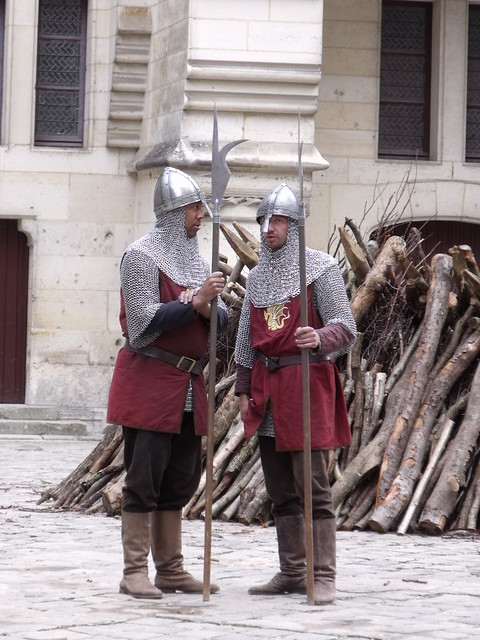
As Merlin has magic, and was constantly going on undercover quests and doing secret tasks that were probably against Camelot law, there were many times when he needed to distract the guards (or in some cases knock them out or lock them up), and what better way to do that than use magic?
Here are all the spells that Merlin used to "distract" the guards (and others)!
Spells all performed by Merlin
Series 1, episode 3, The Mark of Nimueh
Spell: Unsterian unbregdan (10 - spell number)
Pronounced: un-ste-ree-an un-breg-dan
What it does: Makes a door creak open.
Used to distract a knight who was performing a search with the Camelot guards.
Spell: Boanloag gesweorc! (74)
Pronounced: Bee-an lee-ay skee-ess-wee-ok!
What it does: Creates mist (see right)
OK, this isn't tecnically a distract-the-guards spell, but it is used in a similar way....
Series 2, episode 4, Lancelot and Guinevere
Spell: Binde tohfeorhe (75)
Pronounced: bin-day toe-fee-or-ray
What it does: Makes a barrel roll forward.
Now, these spells are the classic way that Merlin distracts the guards!
Spell: Alyse!(76)
Pronounced: Al-ee-say!
What it does: Makes a barrel stand up on end
The second spell in this sequence.
Spell: Sweflay!(77)
Pronounced: Sweh-flay!
What it does: Makes loads of barrels roll forward!
See the video.
| Halig the bounty hunter |
Spell: Ic bebeod this giestern fellon(100)
Pronounced: Ik beh-bod this et-ern fel-lon
What it does: Breaks a chain of a sign... which falls on Halig's head.
So not a guard... but still, it was used to distract/knock out him>>>>>>>>>>>>>>>>>>>>
Series 4, episode 10, A Herald of The New Age
Spell: Strangath bydenfaetu (216)
Pronounced: Stran-gath bad-un feth-oo
What it does: Makes a barrel roll forward
Another classic "distract the guards" sequence.
Spell: Wyrth gatu faest (217)
Pronounced: Yar-t gat-oo fay-st
What it does: Closes and locks doors.
... With the guards inside!
So there are all of the distracting-the-guards spells I can think of, even though half of them aren't technically "distracting-the-guards" spells, but they are all used in similar situations.
